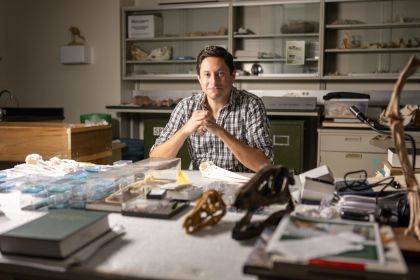Breadcrumb
Pacific professor's expertise earns prestigious Norton Critical Edition honor

University of the Pacific Professor of English Courtney Lehmann has hit a mark few will attain. Her essay for the “Macbeth Third Norton Critical Edition”—the only new scholarly perspective included in the 2025 edition, published by New York City-based W.W. Norton and Company, is a career milestone she’s been working on since 2022.
“This is shocking to me still. It'll be another 15 years before an essay of this nature comes out for 'Macbeth' and I'm blown away to be honest. I was thrilled when I saw that I happened to be very luckily among a small crowd,” she said.
The Norton Critical Edition of Shakespeare’s famous play is widely used for people reading and studying "MacBeth," including millions of students and teachers globally, spanning the high school and university level.
Although Lehmann’s essay centers on Joel Coen’s film “The Tragedy of Macbeth” (2021) starring Denzel Washington and Frances McDormand, Lehman was only eight years old when she fell in love with Shakespeare at a local hometown production of “Romeo and Juliet.”
“There was this one really subversive moment that got me hooked on the countercultural, the subcultural, the perspective from the margins as opposed to the perspective from the center,” she explains.
In this production, as Mercutio dies and says the well-known lines: “'twill serve, 'till do, ask for me tomorrow and you shall find me a grave man,” he pulls Romeo toward him as they're saying goodbye and in his last gasps, they kiss.
Lehman remembers turning to her mother in shock at the sight of two men kissing, something she had never seen before.
“I thought, ‘oh yeah, I like this Shakespeare guy. This is new.’ At the time, I could sense even as an 8-year-old that was going to chafe with people,” Lehmann said. “That friction I could anticipate, I could feel, and I knew I wanted to get behind things that challenge our assumptions about what love looks like.”
Lehman said the production made her realize the love story wasn’t limited to Romeo and Juliet. It also centered on Romeo and Mercutio and the strong bond they share. This revelation was the catalyst to a career of analyzing and employing perspectives presented though Shakespeare’s work in the real world.
“I fell in love at that moment and knew I wanted to pursue this playwright and his work for as long as I could. I'm still doing it,” she said, “There are so many different uses of Shakespeare right now. The research I did for the Norton Critical essay can translate to the classroom, and the films offer me a platform for discussing social justice with my students.”
“Dr. Lehman brings Shakespeare to life by making it relevant to students today. She showed me that Shakespeare’s characters are relatable and present today in many adaptations. Dr. Lehman was always so enthusiastic which made me excited to come to class! She is a true expert and I learned so much from her,” said Emma Gerber ’25, a student who took Lehmann’s class and worked with her through Pacific’s Powell Scholars program.
Lehman’s essay analyzes five film adaptations of Shakespeare's “Macbeth.”
“Courtney Lehmann is one of this generation's leading Shakespeare scholars, specializing in film adaptations and global productions of the plays. She has a distinctively informative and entertaining critical voice and a perspective that considers current interest in race and gender politics,” said Norton Critical Edition editor Robert Miola.
The honor of being commissioned to write in the prestigious Norton Critical Edition didn’t come without challenges, said Lehman.
“It was extremely hard to feel like I had done my due diligence reaching out to as many critical communities as I could, but also making this an accessible essay for undergraduates to benefit from.”
Lehman said writing the essay was a delicate balancing act to write a piece that is comprehensive and encompassing but also represents her dedication to social justice.
“From the beginning, I saw Shakespeare as someone who could move mountains in terms of the way we think about things and the actions we take as a result of them,” she said. “I think he challenges us to recognize our shared humanity and then charges us with doing something about the injustices encoded in his work and still visible in our societies today.”






